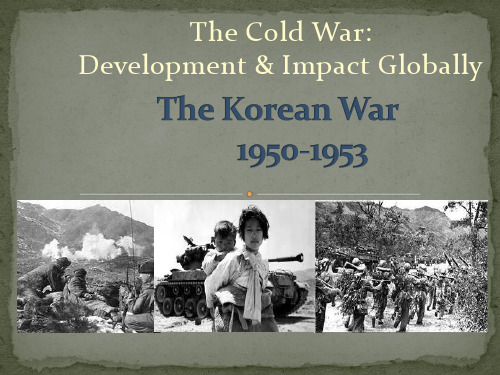The Cold War
- 格式:pptx
- 大小:4.99 MB
- 文档页数:30

朝鲜战记的英语作文The Korean War, which lasted from 1950 to 1953, was a significant event in modern history. It was a conflict between North Korea, supported by the Soviet Union and China, and South Korea, supported by the United States and the United Nations. The war had a profound impact on the Korean Peninsula and the global political landscape. This essay will discuss the causes, major events, and consequences of the Korean War.The Korean War was a result of the division of Korea after World War II. In 1945, the Korean Peninsula was liberated from Japanese colonial rule, and the country was divided at the 38th parallel, with the Soviet Union occupying the north and the United States occupying the south. The division was intended to be temporary, but as the Cold War intensified, both sides established separate governments and sought reunification on their own terms. Tensions escalated, and on June 25, 1950, North Korea launched a surprise invasion of South Korea.The invasion by North Korea caught the South Korean forces off guard, and they quickly lost ground. The United Nations Security Council, with the absence of the Soviet Union, passed a resolution condemning the invasion andcalled for military assistance to South Korea. The United States led a multinational force, predominantly composed of American troops, to support South Korea. The war became a proxy war between the United States and the Soviet Union, with China also becoming involved in support of North Korea.The Korean War was marked by several major events that shaped its outcome. The most notable event was the Battleof Inchon in September 1950, where General Douglas MacArthur launched a successful amphibious landing behind enemy lines, cutting off North Korean supply lines and forcing them to retreat. This victory turned the tide ofthe war in favor of the United Nations forces. However, as the United Nations forces approached the Chinese border, China intervened and pushed them back. The war then settled into a stalemate, with both sides engaging in trenchwarfare along the 38th parallel.The Korean War had significant consequences for all parties involved. The most immediate consequence was the loss of lives and destruction of infrastructure. It is estimated that over 2 million Koreans, both military and civilian, were killed during the war. The war also resulted in the division of Korea into two separate countries, with the demilitarized zone serving as a heavily fortified border between North and South Korea. The conflict further deepened the divide between the United States and the Soviet Union, leading to an escalation of the Cold War.In conclusion, the Korean War was a complex and significant event in modern history. It was a result of the division of Korea after World War II and the escalating tensions of the Cold War. The war had major events such as the Battle of Inchon and Chinese intervention, which shaped its outcome. The consequences of the war were devastating, with loss of lives and the division of Korea. The Korean War serves as a reminder of the ongoing conflicts and tensions that exist in the world today.。

冰山上的来客英语作文英文回答:The Iceberg Cometh: A Metaphorical Exploration of the Cold War。
The Cold War, a geopolitical stalemate between the United States and the Soviet Union, lasted for nearly five decades and left an enduring legacy on global politics. During this period of intense tension and rivalry, the United States and the Soviet Union engaged in a fierce arms race, ideological battles, and proxy wars around the globe.One of the most striking metaphors used to describe the Cold War is "the iceberg cometh." This metaphor suggests that the Cold War was not merely a superficial conflict but an underlying tension that had the potential to escalate into a full-blown war. The iceberg represents the latent danger that could erupt at any moment, while the waterline represents the surface tension between the two superpowers.The metaphor is apt for several reasons. First, it captures the sense of constant threat and uncertainty that characterized the Cold War. The threat of nuclear war hung over the world like the proverbial sword of Damocles, and both sides were constantly on the lookout for potential threats. The arms race fueled this tension, as each superpower sought to gain an advantage over the other.Second, the iceberg metaphor highlights the importance of ideology in the Cold War. The United States and the Soviet Union represented two opposing ideologies: capitalism and communism. Each side believed in the superiority of its own system and sought to spread its influence around the world. The ideological divide between the two superpowers made it difficult to find common ground and resolve conflicts peacefully.Third, the iceberg metaphor points to the role of third parties in the Cold War. Many countries around the world were caught in the crossfire of the conflict, as the United States and the Soviet Union sought to gain allies andexpand their influence. These countries often became battlegrounds for proxy wars, as the superpowers fought for control over strategic resources and geopolitical advantage.The Cold War ultimately ended with the collapse of the Soviet Union in 1991. However, the legacy of the Cold War continues to shape global politics today. The arms race has left behind a vast arsenal of nuclear weapons, and the ideological divide between capitalism and communismpersists in many parts of the world. The metaphor of "the iceberg cometh" serves as a reminder of the dangers of unchecked rivalry and the importance of finding peaceful ways to resolve international conflicts.中文回答:冰山来客,冷战的隐喻探索。




热战(kineticwar)和冷战(ColdWar)我们在看新闻的时候,经常看到有两个单词“热战”和“冷战”。
“冷战”英文是Cold War,cold 是冷,和中文翻译是相对应的。
但是“热战”的英文kinetic war却是有一点出人意料,因为kinetic的意思是“运动的; 运动引起的”。
如果直译kinetic war是“运动战”,现在中文翻译的是“热战”。
百度解析“热战”---指使用武器的实际战争(对“冷战”而言)。
google 解析“热战”(kinetic war): Kinetic military action is a euphemism for military action involving active warfare, including lethal force. The phrase is used to contrast between conventional military force and "soft" force, including diplomacy, sanctions and cyber warfare.动能军事行动是委婉语,涉及包括致命武力在内的积极战争。
该词用来对比常规军事力量和“软”力量,包括外交,制裁和网络战。
Timothy Noah的文章“Birth of a Washington Word” (“华盛顿单词的诞生”)提到:In common usage, “kinetic” is an adjective used to describe motion, but the Washington meaning derives from its secondary definition, “active, as opposed to latent.” Dropping bombs and shooting bullets—you know, killing people—is kinetic. But the 21st-century military is exploring less violent and more high-tech means of warfare, such as mess ing electronically with the enemy’s communications equipment or wiping out its bank accounts. These are “non-kinetic.” (Why not “latent”? Maybe the Pentagon worries that would make them sound too passive or effeminate.) Asked during a January talk at National Defense University whether “the transformed military of the future will shift emphasis somewhat from kinetic systems to cyber warfare,” Donald Rumsfeld answered, “Yes!” (Rumsfeld uses the words “kinetic”and “non-kinetic” all the time.)上面中文翻译是:通常“kinetic”是形容运动的形容词,但华盛顿的含义源于其次要定义,即“主动而不是隐藏的”。